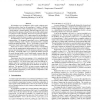Free Online Productivity Tools
i2Speak
i2Symbol
i2OCR
iTex2Img
iWeb2Print
iWeb2Shot
i2Type
iPdf2Split
iPdf2Merge
i2Bopomofo
i2Arabic
i2Style
i2Image
i2PDF
iLatex2Rtf
Sci2ools
138
click to vote
ICCAD
1997
IEEE
1997
IEEE
Negative thinking by incremental problem solving: application to unate covering
We introduce a new technique to solve exactly a discrete optimization problem, based on the paradigm of “negative” thinking. The motivation is that when searching the space of solutions, often a good solution is reached quickly and then improved only a few times beforethe optimum is found: hencemost of the solutionspace is explored to certify optimality, but it does not yield any improvement of the cost function. So it is quite natural for an algorithm to be “skeptical”about the chanceto improve the current best solution. For illustration we have applied our approach to the unate covering problem. We designed a procedure, ¥§¦©¨¥ , implementing a negative thinking search, which is incorporated into a common branch-and-bound procedure. ¦©¨¥ is invoked at a node of the search tree which is deep enough to justify negative thinking. Raiser tries to detect a hard core of the matrix corresponding to the node by augmenting an independent set of rows in order to i...
| Added | 06 Aug 2010 |
| Updated | 06 Aug 2010 |
| Type | Conference |
| Year | 1997 |
| Where | ICCAD |
| Authors | Evguenii I. Goldberg, Luca P. Carloni, Tiziano Villa, Robert K. Brayton, Alberto L. Sangiovanni-Vincentelli |
Comments (0)

